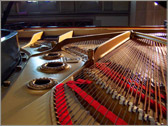PIANO TUNING
Question & Answer

What is tuning?

Tuning is the fine adjustment of the tension on the piano's strings. Unlike other stringed instruments, the piano has approximately 220 strings that are strung at a very high tension. Professional piano technicians are well equipped to deal with the many problems may come up during a tuning and to leave the piano sounding its best.
Strictly speaking, tuning does not include the many other maintenance issues that come up during the piano's life. Many technicians include some action adjustments and repairs in the cost of a tuning. Hire only a technician who knows how to maintain the action and structure of your instrument. If you aren't sure, ask.

How often should I have my piano tuned?

If your piano is new, check what the manufacturer recommends. This is usually 4 times in the first year or two, three times during the next and two per year thereafter. As the new instrument settles, less frequent tuning may be required. Older instruments may only require yearly tuning but tone and action responsiveness may need addressing.

When is the best time to have my piano tuned?

In our extreme climate, the worst times to tune are at the height of the dampness of July and August or during the driest months of January and February. Unfortunately, these times are when your piano will sound at its worst. Teachers and other professionals may not have any other choice but to go ahead and have the piano tuned. Any other time of the year is fine for most owners.

I don't use the piano anymore, do I need to keep tuning it?

If you have a piano that you aren't using, why not sell it? The piano may have a better chance of surviving in someone else's care. If you want to keep it for other reasons, please consider having it tuned and cleaned from time to time.

I'm selling the old cottage and am thinking I'll bring the old cottage piano home with me. Is there anything to consider? It works perfectly and has never needed a tuning.

Having tuned in cottage country for almost 20 years, I have heard this type of question many times. If you want to watch your beloved piano slowly (sometimes not so slowly) fall apart during the first or second heating season, then bring it home. The reason your piano never really went out of tune at the cottage was that it was saturated with moisture and never had a chance to dry out. This causes damage at the cellular level of the wooden components of the piano (soundboard, pinblock, bridges, case, keys and action). This damage only becomes apparent after the piano dries out. The soundboard will develop severe cracking, the tuning pins will loosen, the glue joints in the action and case will fail. In short, your piano will be useless. There is no way to stop this from happening. This goes for pianos stored in unheated garages, on porches and in damp basements.

What is a pitch-raise?

If a piano is grossly flat, it will require a double or triple tuning. This can be done during one appointment. Expect to pay a little more for this service as it is a tiring and stressful procedure. A return visit within a few months may also be necessary.
To request a piano tuning, click This e-mail address is being protected from spambots. You need JavaScript enabled to view it
